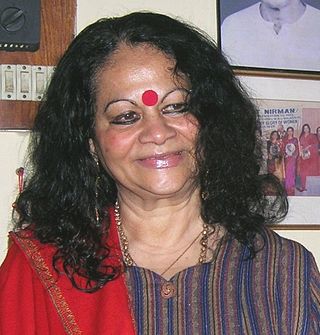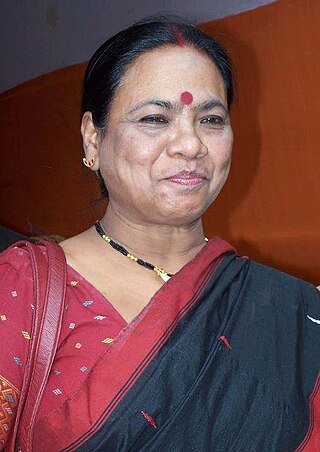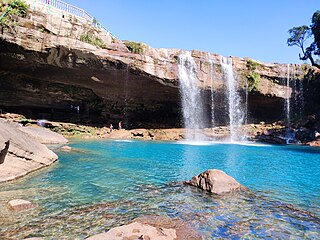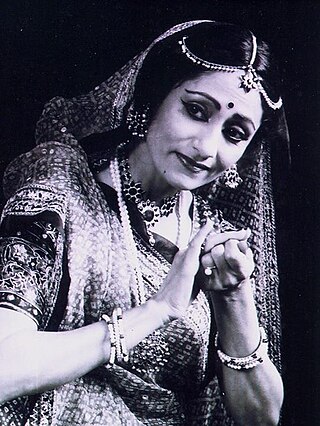Evelyn Norah "Rani" Shullai is an educationalist and a pioneer of Girl Guiding in India. She has received numerous awards including the Silver Star from the Indian government and the Silver Elephant from the Bharat Scouts and Guides. Shullai is the second Padma Shri recipient in Meghalaya, [1] given in 1977.
Shullai married a fellow teacher, H. Pariat, from the Jowai Government School in the Jaintia Hills. He died before the birth of their child, Judith. She remarried. She has several grandchildren. Her hobbies include winemaking and cooking, and formerly gardening and knitting. [2]
Shullai was involved in Girl Guiding in her time at Welsh Mission Girls’ High School (now called Presbyterian Secondary School) in Shillong, and continued while she studied at Scottish Church College in Calcutta. Here she was a Ranger and was involved for six years with a village near Serampore, teaching hygiene and enabling villagers to construct wells. In 1980, she led the Indian contingent to the international camp in Sydney. In 1984, she represented India at WAGGGS' World conference in New York City. Shullai has been awarded the Silver Elephant. [ citation needed ]
Shullai taught at the Jowai Government School and the American Ludlow Jute Mill School, the latter twenty-eight miles from Calcutta. She became headmistress of the Assamese M.E. School and opened a Montessori school on campus. [ citation needed ]
Shullai was appointed the first assistant Inspector of Schools for hill areas of composite Assam and later as Inspector of Schools in Shillong for a decade. In between, the Assam government sent her to the Central Institute in Delhi to study for a M Ed. After her retirement, a school was opened in Shillong in her name - the Shullai Progressive School. Shullai teaches in the school. [ citation needed ]

Meghalaya is a state in northeast India. Meghalaya was formed on 21 January 1972 by carving out two districts from the state of Assam: (a) the United Khasi Hills and Jaintia Hills and (b) the Garo Hills. The estimated population of Meghalaya in 2014 was 3,211,474. Meghalaya covers an area of approximately 22,429 square kilometres, with a length-to-breadth ratio of about 3:1.

Shillong is a hill station and the capital of Meghalaya, a state in northeastern India. It is the headquarters of the East Khasi Hills district. Shillong is the 330th most populous city in India with a population of 143,229 according to the 2011 census. It is said that the rolling hills around the town reminded the British of Scotland. Hence, they would also refer to it as the "Scotland of the East".

Jowai is the headquarters of the West Jaintia Hills district of the state of Meghalaya, India, and is home to the Pnar, a sub-tribe of the Khasi people. It is located on a plateau surrounded on three sides by the Myntdu river bordering Bangladesh to the south. Due to its high altitude of 1365 m above sea level, Jowai experiences warm summers with cool to chilly winters.

The Bharat Scouts and Guides (BSG) is the national Scouting and Guiding association of India. The national headquarters of BSG is recognised by the Government of India.

The Bangladesh Scouts is the national Scouting organization of Bangladesh. Now The Chief Scout of Bangladesh is Mohammed Shahabuddin. Scouting was founded in 1914 in East Bengal, now Bangladesh, as part of the British Indian branch of The Scout Association, and continued as part of the Pakistan Boy Scouts Association until the country's divided sections split in 1971 during the Bangladesh Liberation War. Following its independence, in 1972, the Bangladesh Boy Scout Association was officially formed as successor of the Pakistan Boy Scouts Association. Bangladesh became an independent member of the World Organization of the Scout Movement in 1974. The organization changed its name to "Bangladesh Scouts" in 1978. The organization has 2,261,351 members as of 2021.

Indira Goswami, known by her pen name Mamoni Raisom Goswami and popularly as Mamoni Baideo, was an Indian writer, poet, professor, scholar and editor.

Gaidinliu Pamei popularly known as Rani Gaidinliu was a Kabui people spiritual and political leader who led a revolt against British rule in India. At the age of 13, she joined the Heraka religious movement of her cousin Haipou Jadonang. The movement later turned into a political movement seeking to drive out the British from Manipur. Within the Heraka faith, she came to be considered an incarnation of the Goddess Cherachamdinliu. Gaidinliu was arrested in 1932 at the age of 16, and was sentenced to life imprisonment by the British rulers. Jawaharlal Nehru met her at Shillong Jail in 1937, and promised to pursue her release. Nehru gave her the title of "Rani" ("Queen"), and she gained local popularity as Rani Gaidinliu.

The Assam Regiment is an infantry regiment of the Indian Army. The regiment consists of 25 battalions: 15 regular battalions, 3 Rashtriya Rifles battalions, 5 Territorial Army battalions & 2 Arunachal Scouts battalions. It recruits exclusively from all the eight Northeastern states of India.

Eastern Bengal and Assam was a province of India between 1905 and 1912. Headquartered in the city of Dacca, it covered territories in what are now Bangladesh, Northeast India and Northern West Bengal.

Chetana Das is an Indian actress from Assam. She is popular face in Assamese cinema for her comic roles. She is the comedy queen of Assamese film industry.

Pratima Barua Pandey was an Indian folk singer from the royal family of Gauripur in Western Assam's Dhubri district. Barua Pandey, a national awardee, best known for her Goalpariya songs Hastir Kanya and Mur Mahut Bandhure, was the daughter of Prakritish Chandra Barua (Lalji) and niece of filmmaker Pramathesh Barua of Devdas fame.

The Khasi and Jaintia Hills are a mountainous region in India that was mainly part of Assam and Meghalaya. This area is now part of the present Indian constitutive state of Meghalaya, which includes the present districts of East Jaintia Hills district, headquarter Khliehriat, West Jaintia Hills district, headquarter Jowai, East Khasi Hills district, headquarter Shillong, and West Khasi Hills district, headquarter Nongstoin.
Beltola is a prime residential area in the southern part of Guwahati, Assam. It is an adjoining area of the Dispur capital complex. During Ahom reign, Beltola was a small Koch kingdom, whose ruler assisted in the administration of the Borphukan in Guwahati, the Ahom viceroy of Lower Assam and in maintaining relations with the communities of Khasi Hills. The kingdom of Beltola survived under the British rule and existed till 1947 when it finally joined the Union of India.

Charles Kenneth Rhodes CIE ICS was a British civil servant who worked for the British Empire's Indian Civil Service (ICS).

West Jaintia Hills is an administrative District in the state of Meghalaya in India. The united district was created on 22 February 1972 and occupied an area of 3819 km2. It had a population of 272,185. The district is part of the Meghalaya subtropical forests eco-region. With the bifurcation of the erstwhile Jaintia Hills District into East and West Jaintia Hills Districts, West Jaintia Hills District came into existence on 31 July 2012 with its headquarters at Jowai. Jowai is the host of all the heads of important governmental offices and establishments, educational institutions, hospitals, banking institutions, etc.

Rani Karnaa was an Indian classical dancer, known for her proficiency in the Indian dance form of Kathak, and regarded by many as one of the greatest exponents of the art form. She was honoured by the Government of India, in 2014, by bestowing on her the Padma Shri, the fourth highest civilian award, for her services to the field of dance.

National Highway 6, commonly referred to as NH 6, is a primary national highway in India. The highway passes through the Indian states of Meghalaya, Assam, and Mizoram. Before renumbering of national highways NH-6 was variously numbered as old national highways 40, 44, 154 & 54.
Silverine Swer (1910–2014), popularly known as Kong Sil, was an Indian social and environmental activist, educationist and civil servant. She was the first person of tribal origin to hold senior posts with the Government of Meghalaya, and was a recipient of the Silver Elephant Medal of the Bharat Scouts and Guides Award and Kaisar-i-Hind Medal. The Government of India awarded her the fourth highest civilian award of Padma Shri in 1990, making her the first recipient of the award from the state of Meghalaya.
Manas Chaudhuri is an Indian journalist and the former editor of Shillong Times, an English-language daily published from the Meghalayan capital of Shillong. He won as a legislator to the Shillong Assembly twice from Mawprem constituency as an independent candidate. . He is a former cabinet minister of the State and served Shillong Times as its Editor from 1978 to 2008, when he resigned from the post for Patricia Mukhim to take over. The Government of India awarded him the fourth highest civilian honour of the Padma Shri, in 2005, for his contributions to Indian journalism. He is the founder of the Ardhendu Chaudhuri Charitable Trust.
Pushpalata Das (1915–2003) was an Indian independence activist, social worker, Gandhian and legislator from the north-east Indian state of Assam. She was a member of Rajya Sabha from 1951 to 1961, a member of the Assam Legislative Assembly and a member of the working committee of the Indian National Congress. She served as the chairperson of the Assam chapters of the Kasturba Gandhi National Memorial Trust and Khadi and Village Industries Commission. The Government of India awarded her the third highest civilian honour of the Padma Bhushan, in 1999, for her contributions to society.